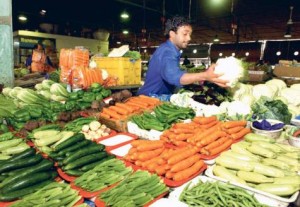
Khaleej Times | 24 December 2009
By Abdul Basit
DUBAI - The UAE plans a food security strategy in which the country will build a three-month strategic stockpile of 15 commodities, to discourage rising ?food prices.
The Ministry of EconomyMinistry of Economy, in cooperation with the authorities concerned, is working on devising a food security strategy, Minister of Economy Sultan bin Saeed Al Mansouri said.
"The strategy will establish an early warning system for crises and disasters that may affect national food security in the country and build strategic stock of 15 commodities that covers three months in the first phase," the minister said. Mansouri said in remarks late on Tuesday that the UAE's food security strategy would be put before the federal cabinet for consideration. Projections indicated that prices of many essential commodities would rise during the coming couple of years, he said.
Gulf countries, mainly reliant on food imports, have ramped up efforts to secure food supplies through buying farmland in developing nations or buying stakes in agriculture companies.
Mansouri said the UAE plans to invest in agriculture overseas, including in Sudan and planting rice in Cambodia. Saudi Arabia is also interested in Pakistan for leasing an area of farmland nearly twice the size of Hong Kong, in a bid to ensure food security. In April, Pakistan said it would offer foreign investors one million acres of farmland for lease or sale and deploy special security forces to protect it. Saudi Arabia, which consumes 2.6 million tonnes of wheat a year, is abandoning a project to produce the grain domestically as water supplies run dry. The kingdom is encouraging domestic food companies to invest in Africa and Asia as the government seeks to reduce domestic grains production to conserve water.
Almarai Company and Savola Al Azizia United Company are among the Saudi companies increasing their investments in agricultural and food production abroad to meet growing demand in the kingdom and in other Middle Eastern countries. Saudi Arabia wants to stop domestic wheat production by 2016 to conserve water.
Saudi Arabia is encouraging overseas investments in nations such as Ethiopia, Tanzania, Vietnam and the Philippines. A group of Saudi Arabian investors said in October they planned to establish the International Agriculture and Food Investment Company, a 2 billion riyal company to invest in agricultural projects.










